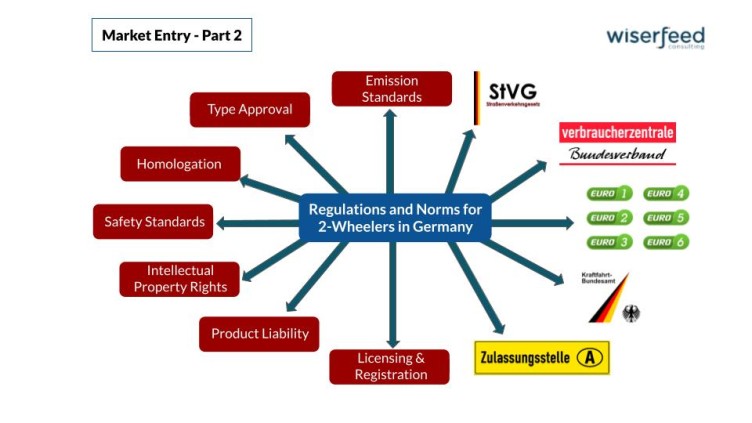Safety of all kind – People, Environmental, Technical is very crucial on the road for any country. To ensure proper safety protocols being followed by the vehicle manufacturers in the nation every country has a set of procedures, rules and regulations which need to be checked of before a vehicle is introduced on the road. Here are some important regulatory checks a 2-wheeler vehicle manufacturer needs to conduct before launching a 2-wheeler on the German roads:
- Homologation: Homologation refers to the process of obtaining approval for vehicles to be sold in Germany. Manufacturers must ensure that their 2-wheelers meet the applicable technical standards defined by the Federal Motor Transport Authority (Kraftfahrt-Bundesamt or KBA) in Germany. This includes adherence to emission regulations, safety standards, and other technical requirements. Currently homologation for 2-wheeler motorbikes is in accordance with Regulation (EU) No 168/2013. For small EVs like e-bikes, e-scooters, self-balancing e-vehicles the certification are in accordance with the German Ordinance on Very Small Electric Vehicles (Elektrokleinstfahrzeuge-Verordnung – eKFV) in conjunction with the German Road Traffic Licensing Regulations (StVZO) as well as the standard for electric motor-assisted wheels – EPAC in accordance with DIN EN ISO 15194:
- Type Approval: Type approval is the certification process that verifies the compliance of a specific model of a 2-wheeler with the relevant regulations. The German Road Traffic Act (Straßenverkehrsgesetz – StVG) stipulates that all motor vehicles used on roads must be type-approved. It involves testing and validating the vehicle’s performance, emissions, and safety features. The KBA is responsible for granting type approvals in Germany.
- Emission Standards: 2-wheelers in Germany must meet certain emission standards, especially for motorcycles and scooters. The Euro emission standards define the maximum allowable limits for pollutants emitted by vehicles. Manufacturers must ensure that their 2-wheelers comply with the applicable Euro emission standards to be legally sold in Germany. Currently the 2-Wheelers sold in Germany are required to fulfil the Euro 5 standards of emissions and in addition to that there is a 78 decibels noise limit set by the EU for the vehicle manufacturers to adhere to.
- Licensing and Registration: 2-wheelers in Germany must be properly licensed and registered. Manufacturers or importers should ensure that their vehicles have the necessary documentation, including vehicle identification numbers (VINs) and compliance certificates, to facilitate the licensing and registration process. The registration process typically involves the local vehicle registration authority (Zulassungsstelle).
- Safety Standards: 2-wheelers must meet specific safety requirements in Germany. This includes compliance with regulations related to lighting, braking systems, tires, mirrors, noise levels, and other safety features. Motorcycle safety standards come under the purview of ISO 26262. The KBA sets and enforces these safety standards to ensure the vehicles’ roadworthiness and the safety of riders and other road users.
- Product Liability: Manufacturers must adhere to product liability laws, which hold them responsible for ensuring the safety and quality of their 2-wheelers. The German Product Liability Act (Produkthaftungsgesetz) governs the circumstances under which manufacturers are liable for damages caused by defective goods. Additionally, consumer protection laws govern advertising, warranties, and other aspects of selling and servicing 2-wheelers to protect consumers’ rights. The Federal Ministry of Justice and Consumer Protection (BMJV) and Federation of German Consumer Organisations (Verbraucherzentrale Bundesverband – vzbv) are responsible for the consumer protection laws in Germany.
- Intellectual Property Rights: Manufacturers entering the German 2-wheeler market should protect their intellectual property rights, including trademarks, patents, and designs. Proper registration and enforcement of intellectual property rights are essential for maintaining brand exclusivity and preventing infringement.
Launching a product/service in a new market is a very crucial decision for any firm so to help your process of market entry, we at Wiserfeed Consulting offer full service market research for your product/service in the market you aspire to enter. Contact for more details!





